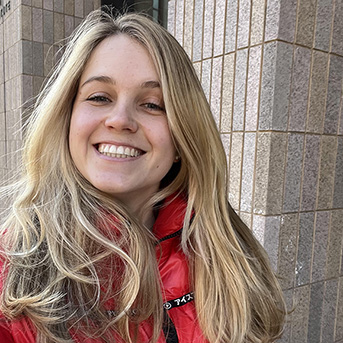June 9 - July 5, 2024.
Summer School is a full-time (all-day) commitment. All participants are expected to attend the entire program in person.
The registration fee for participants from academic institutions: $4,500.
The registration fee for participants from the corporate/private sector: $6,000.
The registration fee covers course-related costs, accommodations, and meals. Students are responsible for the cost of travel.
Participants generally secure funding to attend from their home institution, or sometimes from a third-party funding source. Once accepted, participants may apply for partial or full registration fee waivers from SFI based on need. Please read more under CSSS FAQs.
- Develop a deeper understanding of the theory and methods used to describe and predict the behavior of complex systems.
- Explore the latest applications of complex systems science to diverse research questions.
- Collaborate on a transdisciplinary research project in complex systems science. Explore past CSSS projects on our Projects pages.
- Connect with future colleagues and collaborators and the SFI research community.
 |
 |
 |
| IAIA |
Santa Fe Institute |
downtown Santa Fe, NM |
The Summer School sessions take place on the campuses of the Santa Fe Institute (SFI) and the Institute of American Indian Arts (IAIA) in Santa Fe, New Mexico. Participants are accommodated in student dormitories on the IAIA campus.The IAIA campus is located in a beautiful Southwest high desert setting with mountain views, extensive walking trails, and quiet places for contemplation, and a short drive to the SFI campus.
Program Director

Photo Credit: Doug Merriam
Program Director Dave Feldman is a professor of physics and mathematics at the College of the Atlantic in Bar Harbor, Maine. He has been involved in CSSS since 2004. Feldman served as co-director of CSSS Beijing from 2006 to 2008 and has directed CSSS in Santa Fe since 2017. He has published two books, one an introductory textbook on chaos and fractals and a book on dynamical systems that is part of the Primers in Complex Systems series. Feldman is a major contributor to Complexity Explorer, where you can take his courses on Dynamical Systems and Chaos and Fractals and Scaling.
Project Coordinators
 |
 |
Julie Hayes
Julie is a “field computer scientist” and PhD student in the Moses Biological Computation Lab at the University of New Mexico and holds a bachelor’s degree in Ecology and Evolutionary Biology from the University of Colorado. She uses data-driven, agent-based computational models to study ecological, evolutionary and collective phenomena. She has taught over one thousand students in wild places across the western United States through her career in outdoor education. |
Taylor Pullinger
Hailing from South Africa but now living in New York City, Taylor recently defended her Ph.D. in Biomedical Sciences at the Icahn School of Medicine at Mount Sinai where she used computational modeling methods to study cardiac arrhythmia. Her academic pursuits have always been informed by an underlying interest in complex systems, and she attended CSSS in the summer of 2022. In her free time Taylor plays squash, makes pottery, and enjoys spending time outdoors. |
SFI Faculty and Invited Experts
Complex Systems Summer School confirmed speakers include:
Liz Bradley • nonlinear dynamics | André de Roos • population structure | Stephanie Forrest • biocomputation and security | Jacob Foster • LLMs, NLP | Laurent Hébert-Dufresne • networks | Balazs Kovacs • communication and perceptions | David Krakauer • complexity | Tom McCarthy • novelist | Melanie Mitchell • artificial intelligence | Cristopher Moore • computation | Melanie Moses • robotics | Neave O'Clery • economics | Brandon Ogbunu • institutions | Walter Powell • transfer of ideas | Elly Power • social structure | Samuel Scarpino • data science and epidemiology | Rajiv Sethi • economics and markets | Porter Swentzell • Indigenous culture | Fernanda Valdovinos • networks and ecology | Andreas Wagner • fitness | Amy Wesolowski • epidemiology | Geoffrey West • singularities | Thalia Wheatley • collective emotions | Hyejin Youn • innovation

Applications are accepted from graduate students, postdoctoral fellows, faculty and professionals in any discipline, including fields not traditionally represented in the sciences (e.g. the humanities or arts) who feel their work connects to a rigorous study of complex systems.
Applicants from any country are welcome. Applicants who are not US citizens or permanent residents may need to apply for a visa waiver or B-1 visa. Please see more information under the FAQs.
Eligibility
SFI policy requires participants to provide proof of complete COVID-19 vaccination prior to beginning the program.
The CSSS team is committed to offering inclusive educational programs in which all participants feel valued and supported in their learning journey. We believe that human diversity in all of its dimensions is essential to meaningful scientific progress. We believe that open discourse and respectful sharing of broad perspectives is essential for understanding our world. We work to ensure our educational programs reflect and encourage this diversity and inclusivity, and we welcome you to join us.
While the application period is open, access the application system through the "Apply now!" button at the top right of your screen.
Applicants should submit:
- Biographical information (filled out directly in the application portal).
- A current academic CV or résumé, including a list of publications, if any.
- A statement that describes your scholarly interests in complex systems and your goals in attending Summer School (maximum two pages).
- Two letters of recommendation: one from a supervisor and one from a collaborator.




















